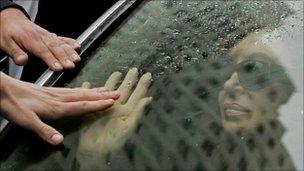Argentina buries former leader Nestor Kirchner
- Published
Rio Gallegos is mourning its most celebrated son
Former Argentine President Nestor Kirchner has been buried in his home town of Rio Gallegos.
Thousands of people waving flags joined the funeral procession led by his widow, current President Cristina Fernandez, before a private ceremony.
Earlier, huge crowds lined the streets of Buenos Aires in pouring rain to salute his coffin.
Mr Kirchner's sudden death on Wednesday has provoked an outpouring of emotion in Argentina.
The former president, who was 60, died of a heart attack
His body was flown to Rio Gallegos in Patagonia in the far south of Argentina after lying in state in Buenos Aires.
National mourning
People queued for hours to pay tribute at the wake in the presidential palace in the capital.
His grieving widow was joined there by other South American leaders, including Hugo Chavez of Venezuela and Brazilian President Luiz Inacio Lula da Silva.
Huge crowds turned out to bid farewell to Mr Kirchner's coffin as it was taken to the airport to be flown to Rio Gallegos.

President Fernandez has lost her closest adviser as well as her husband
Waving flags and placards, mourners chanted and wept as the funeral cortege moved slowly through the rain-swept avenues of Buenos Aires.
The former president, who ran the country from 2003 to 2007, was his wife's chief political strategist after she succeeded him, and was also secretary general of the South American regional grouping, Unasur.
He had been expected to run for president again in the 2011 election.
Mr Kirchner had suffered health problems and had a heart operation last month but nevertheless his death shocked many in Argentina, where three days of national mourning are being observed.
The country's football matches this weekend have been called off.
Mr Kirchner served as mayor of Rio Gallegos before becoming governor of the wider region - the oil and gas-rich province of Santa Cruz.
He became president as Argentina was emerging from a profound political and economic crisis and oversaw the country's return to relative stability and prosperity.
Mr Kirchner also supported the prosecution of those responsible for human rights abuses under military rule in the 1970s and 1980s.
He was a polarising figure, very popular among the trade unions and in the industrial belt around Buenos Aires and deeply unpopular among the wealthy.
He and his wife had faced some criticism for appearing to get around the constitutional limit on two consecutive terms.
Just as Mr Kirchner stood aside for his wife in 2007, it was widely thought Mrs Fernandez would step back and allow her husband to run in the October 2011 election.
- Published27 October 2010
- Published27 October 2010
- Published27 October 2010
- Published27 October 2010
- Published27 October 2010